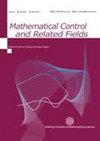由次微分扰动的二维和三维对流Brinkman-Forchheimer方程及其在控制问题中的应用
IF 0.9
4区 数学
Q1 MATHEMATICS
引用次数: 1
摘要
下面的对流Brinkman-Forchheimer (CBF)方程(或阻尼Navier-Stokes方程)在$ d $维环面中考虑位势$ \begin{equation*} \frac{\partial \boldsymbol{y}}{\partial t}-\mu \Delta\boldsymbol{y}+(\boldsymbol{y}\cdot\nabla)\boldsymbol{y}+\alpha\boldsymbol{y}+\beta|\boldsymbol{y}|^{r-1}\boldsymbol{y}+\nabla p+\Psi(\boldsymbol{y})\ni\boldsymbol{g},\ \nabla\cdot\boldsymbol{y} = 0, \end{equation*} $,其中$ d\in\{2,3\} $, $ \mu,\alpha,\beta>0 $和$ r\in[1,\infty) $。对于$ d = 2 $与$ r\in[1,\infty) $和$ d = 3 $与$ r\in[3,\infty) $ ($ 2\beta\mu\geq 1 $与$ d = r = 3 $),我们利用$ m $ -增生算子的抽象理论,建立了上述多值问题唯一全局强解的存在性。此外,我们证明了同样的结果在$ d = 3 $与$ r\in[1,3) $和$ d = r = 3 $与$ 2\beta\mu<1 $的情况下保持局部时间。我们在证明中探讨了非线性算子和多值算子的$ m $ -活跃性,Yosida近似及其性质,以及几个高阶能量估计。对于$ r\in[1,3] $,我们量化(修改)Navier-Stokes非线性$ (\boldsymbol{y}\cdot\nabla)\boldsymbol{y} $以建立存在唯一性结果,而对于$ r\in[3,\infty) $ ($ 2\beta\mu\geq1 $ For $ r = 3 $),我们通过非线性阻尼项$ \beta|\boldsymbol{y}|^{r-1}\boldsymbol{y} $来处理Navier-Stokes非线性。最后,讨论了上述理论在流不变性、时间最优控制和镇定等反馈控制问题中的应用。本文章由计算机程序翻译,如有差异,请以英文原文为准。
2D and 3D convective Brinkman-Forchheimer equations perturbed by a subdifferential and applications to control problems
The following convective Brinkman-Forchheimer (CBF) equations (or damped Navier-Stokes equations) with potential$ \begin{equation*} \frac{\partial \boldsymbol{y}}{\partial t}-\mu \Delta\boldsymbol{y}+(\boldsymbol{y}\cdot\nabla)\boldsymbol{y}+\alpha\boldsymbol{y}+\beta|\boldsymbol{y}|^{r-1}\boldsymbol{y}+\nabla p+\Psi(\boldsymbol{y})\ni\boldsymbol{g},\ \nabla\cdot\boldsymbol{y} = 0, \end{equation*} $in a $ d $-dimensional torus is considered in this work, where $ d\in\{2,3\} $, $ \mu,\alpha,\beta>0 $ and $ r\in[1,\infty) $. For $ d = 2 $ with $ r\in[1,\infty) $ and $ d = 3 $ with $ r\in[3,\infty) $ ($ 2\beta\mu\geq 1 $ for $ d = r = 3 $), we establish the existence of a unique global strong solution for the above multi-valued problem with the help of the abstract theory of $ m $-accretive operators. Moreover, we demonstrate that the same results hold local in time for the case $ d = 3 $ with $ r\in[1,3) $ and $ d = r = 3 $ with $ 2\beta\mu<1 $. We explored the $ m $-accretivity of the nonlinear as well as multi-valued operators, Yosida approximations and their properties, and several higher order energy estimates in the proofs. For $ r\in[1,3] $, we quantize (modify) the Navier-Stokes nonlinearity $ (\boldsymbol{y}\cdot\nabla)\boldsymbol{y} $ to establish the existence and uniqueness results, while for $ r\in[3,\infty) $ ($ 2\beta\mu\geq1 $ for $ r = 3 $), we handle the Navier-Stokes nonlinearity by the nonlinear damping term $ \beta|\boldsymbol{y}|^{r-1}\boldsymbol{y} $. Finally, we discuss the applications of the above developed theory in feedback control problems like flow invariance, time optimal control and stabilization.
求助全文
通过发布文献求助,成功后即可免费获取论文全文。
去求助
来源期刊

Mathematical Control and Related Fields
MATHEMATICS, APPLIED-MATHEMATICS
CiteScore
2.50
自引率
8.30%
发文量
67
期刊介绍:
MCRF aims to publish original research as well as expository papers on mathematical control theory and related fields. The goal is to provide a complete and reliable source of mathematical methods and results in this field. The journal will also accept papers from some related fields such as differential equations, functional analysis, probability theory and stochastic analysis, inverse problems, optimization, numerical computation, mathematical finance, information theory, game theory, system theory, etc., provided that they have some intrinsic connections with control theory.
 求助内容:
求助内容: 应助结果提醒方式:
应助结果提醒方式:


